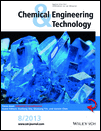Excipients-Induced Salt-to-Free Base Phase Transformation
Abstract
The mechanism of the salt-to-free form drug transformation was explored by investigating the pH-solubility profiles of a model drug in a salt form and the nucleation of the free base from the salt solution when its pH was increasing. The transformation of the salt to the free base during wet massing in the presence of pharmaceutical excipients with different pH was studied. The nucleation of the free base occurred when the pH of the salt solution reached a certain level pHmetastable, which was related to the free energy penalty associated with the creation of a new solid phase. The nucleation of the free base happened readily and thus, the salt-to-free base transformation occurred rapidly during wet massing with the excipients with a pH above the pHmetastable. These results can support robust formulation design of solid dosage forms containing salts by optimal excipient selection.




